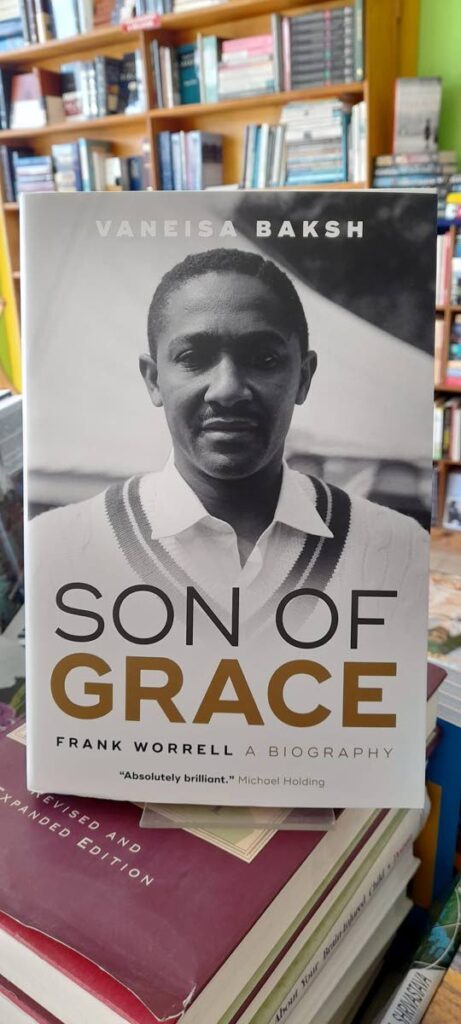Son of Grace: Clearer picture of cricket legend Frank Worrell

IF Frank Worrell's life were judged solely by his cricket career, his legacy would be confined to indelible images of elegant and skilful batting; inspiring and historic leadership as the first black captain of a West Indies cricket team; and his pioneering role in forging a unified West Indies identity among small countries scattered across the Caribbean.
A hundred years after his birth on August 1, 1924, six biographies keep Worrell’s cricket achievements alive. One of them creates a new vision of Worrell – not primarily defined by cricket, but by his West Indianness.
Son of Grace, by cricket historian and newspaper columnist Vaneisa Baksh, doesn’t analyse Worrell’s cricket career. Instead, it presents the literal and figurative essence of Worrell as the complex, private man who shaped regional cricket, rather than vice versa.
“This is not a cricket book,” says Baksh.
She describes herself as a biographer, not a cricket commentator, and establishes that distinction in the book’s title. Worrell’s mother, Grace, a proud, strong and successful seamstress, laid the foundation for Worrell’s self-image, which would translate on the cricket field as the epitome of grace.
“From his mother, he experienced a social conditioning,” says Baksh. “Grace presented a distant feeling of royalty; a sense that he was different. I think he inhabited two worlds: his mother’s and that of the rest of Barbados.”
His mother’s influence is felt throughout the book.
“There's a nearly unspoken, parallel story going on in Son of Grace paying tribute to a mother who shaped Worrell through her own journey. How did Caribbean women raise noteworthy individuals who shaped transitional eras? Those stories are generational – never solitary journeys.”
Through his mother, Worrell lived a relatively privileged life, but he never lost sight of injustices shaped by colonialism.

As a West Indian, Baksh is well-positioned to probe the West Indies cricketer’s private life and connect it to his stellar achievements. Her master’s thesis focused on the search for West Indian identity as seen in cricketers’ biographies.
“That’s how I felt Worrell should be written about,” she says. “I have never written match reports. I study the people who play cricket – the personalities, environment and social circumstances.”
She began research and writing in 2016. The biography took about six years to complete and was published in 2023 by Fairfield Books, London.
Many challenges surfaced in the early stages of research.
“In TT, we don’t keep documents, archives, and records. Everything I had seen was primarily about cricket – description of cricket matches and Frank’s performances. I was determined not to write about his cricket, but to explore who Frank was, why he had such an impact on cricket internationally and how he formed a West Indian identity. That is not well documented.”
Many potential sources were guarded or silent – almost as though they felt compelled to keep Worrell’s secrets and protect his heroic image.
“No one was as hostile as his sister Grace,” says Baksh. "Grace said, ‘Books have been written.’
"The basic information is the same, but there’s different perspectives in each biography. We don’t yet understand here the value of multiple perspectives.”
As she delved deeper into Worrell's life, Baksh uncovered what friends and family tried hiding. Worrell was a womaniser, a heavy drinker and a member of the Freemasons, once thought of as a secretive cult.
“I realised he probably had children outside of his marriage and that might have accounted for them being guarded, also.”
Baksh persevered, ever aware of the narrowing list of ageing people who knew Worrell.
“In many cases I felt anxious trying to find sources. Some of them didn’t have their memory; some died during the writing of the book. Some people had a million stories; some wild stories couldn’t be corroborated. I listened and thought, ‘What do I make of this?’”
She relied on oral stories to support written cricket stories.
“There were disappointments and serendipitous things, so that in the end, I felt I was blessed by the balance.”
She realised, “Cricket really does reflect a society and a society’s behaviour. That’s why I write about it.”

Worrell’s biography showed a remarkable person aside from cricket: an exceptional athlete, good at swimming and football. Worrell liked boxing and jazz.
Baksh describes him as “very self-aware.” He was a study in contrasts.
“I had evoked the idea of the dandy and the man of extremes. When you think of a spectrum, he could inhabit every part of it, but he would most likely inhabit one end of the extreme.
"There was an introvert in him. I think he spoke about things when he had to, but was not jockeying for the limelight. That is why he has a mystique and remains an enigma. His mother had made him feel he was special, and that brought a feeling of responsibility to behave in a certain way. I think his life was a role that he chose.”
Baksh says Worrell was "a complex individual, generous and confident, bothered and probably inspired by early criticism. He chose to live life on his own terms.
"He was a dedicated cricketer and disciplined batter, who would ask to take a break to go to the movies or take naps during cricket matches.
"Frank attributed these breaks and naps to nervousness, while some wondered if he was sleeping off hangovers," says Baksh.
Worrell was a planner too, methodical and organised.
“His life followed a carefully constructed path. At 12, he chose to stay in Barbados with his grandmother rather than migrate to the US with the rest of his family. It would have been the end of his cricket. Did that show insight, or courage? Sometimes these mysteries have very simple explanations. It could have just been his attachment to his grandmother that kept him in Barbados.”
Baksh noted that his degree in administration from the University of Manchester prepared him for life after cricket, when he worked as the dean of students at the University of the West Indies in Mona, Jamaica.
Social anthropology was his favourite subject and a discipline that formed the foundation for cricket, his life and his West Indian identity. He understood the importance of culture and accepted it as a shaping force.
“He believed in inclusion and felt we were not picking the best cricket teams because of discrimination and insularity. Once you begin to see, you can’t unsee,” says Baksh.
Any contradictions and faults that Worrell possessed made him a more interesting, elusive figure, more human and vulnerable and mysterious than the wise, heroic public figure. These qualities all made Baksh’s job more challenging and rewarding, while sparking probing questions.
“How do you deal with a person’s need for privacy and what you need to do as a writer?
"A background in journalism defines how you approach your subject. I knew there would be material that would be unpalatable. My overall objective was to find the essence of Frank,” says Baksh.
To accomplish her writing goals, she used Worrell’s most important lesson: fairness.
“I didn’t feel it was fair to him as a human to say he was simply all goodness and light. I tried not to be judgmental, but also felt it was important to see him as a human with all the strengths and weaknesses we carry.”
His extraordinary traits far outweighed his indiscretions.
Worrell possessed remarkable empathy. He mentored players – even from the opposition and understood the culture of poverty so many cricketers came from.
“People loved him. He had an aura about him,” says Baksh.
His early death at 42 from leukaemia brightened that aura and buried his flaws. Baksh excavated them to create a clearer picture. Frank Worrell, the famous cricketer and tantalising figure behind the legend still evokes pride, mystery and a feeling of West Indian unity.
You can find Son of Grace by Vaneisa Baksh at Metropolitan bookstores, Paper Based, Scribbles and Quills Ltd or online at amazon.com.

Comments
"Son of Grace: Clearer picture of cricket legend Frank Worrell"